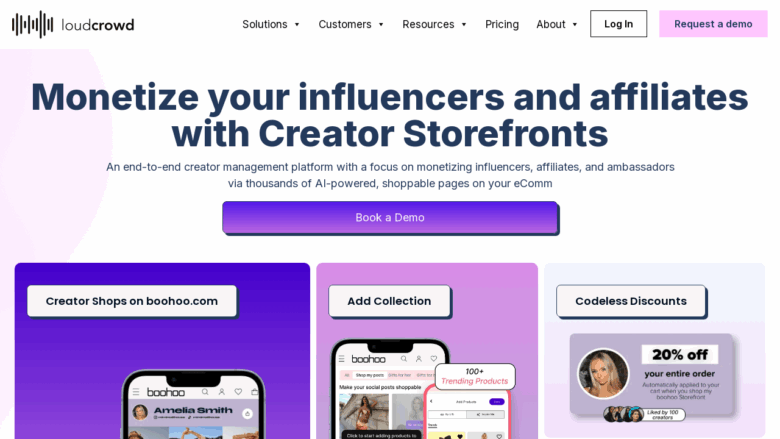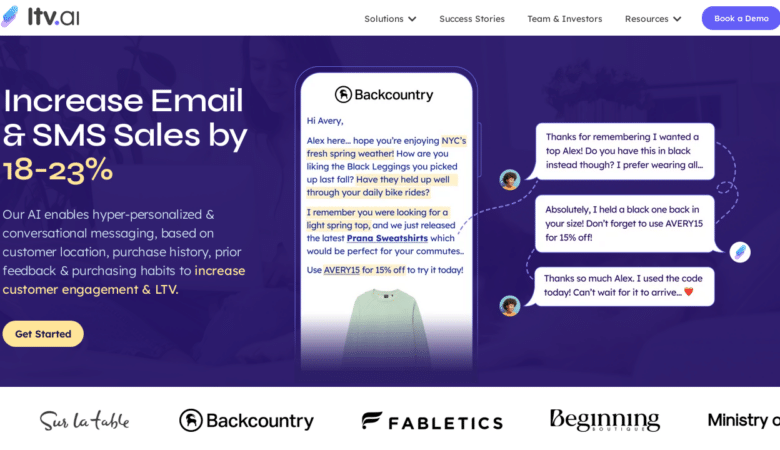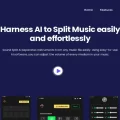Finding solutions that actually improve E-commerce conversion rates is still the holy grail for online businesses in the constantly changing world of e-commerce technology. With its autonomous system of specialised AI agents, apps, and automation, Journey AI is a cutting-edge platform that can revolutionise the consumer journey from ad click to checkout. The friction points that cause cart abandonment have grown more costly to address as online shopping continues to dominate the retail industry. However, does Journey AI fulfil its claim to increase conversions by 5–15%? Let us examine the inner workings of this platform from a technological perspective.
Understanding the Journey AI Ecosystem
Journey AI positions itself as an AI sales engine specifically designed for e-commerce businesses. At its core, the platform consists of a comprehensive system that deploys on your e-commerce storefront to create what they call a “frictionless shopping experience”. Unlike traditional chatbots or customer service tools, Journey AI takes a more holistic approach by addressing the entire customer journey.
The platform’s foundation rests on several key components:
-
AI Sales Agent: A sophisticated conversational AI that engages customers in real-time, offering personalized pre-sales support
-
Standalone Web App: A customizable interface that can operate independently or integrate with existing websites
-
One-Click Checkout System: Streamlined purchase process designed to reduce abandonment rates
-
Data Integration Layer: Backend connections that synchronize with product information, FAQs, policies, and customer data
What makes Journey AI particularly interesting from a technical standpoint is how these components work together to create a cohesive system rather than just providing isolated functionalities.
Technical Architecture Behind Journey AI
The technical architecture of Journey AI reveals a sophisticated approach to e-commerce optimization. The platform relies on a combination of natural language processing, machine learning algorithms, and integration capabilities to deliver its promised functionality.
Natural Language Processing Capabilities
At the heart of Journey AI’s Sales Agent is its advanced natural language processing (NLP) system. This technology enables the AI to:
-
Parse customer queries with high accuracy, even with colloquial language
-
Understand context across multiple exchanges in a conversation
-
Recognize product-specific terminology and match it to inventory
-
Provide relevant, accurate responses in real-time without human intervention
The NLP engine appears to be fine-tuned specifically for e-commerce scenarios, with special attention paid to product search queries, feature comparisons, and purchase intent signals. This domain-specific optimization gives Journey AI an edge over generic AI assistants when handling shopping-related conversations.
Integration Framework
One of the more impressive technical aspects of Journey AI is its integration framework. The platform offers:
-
Seamless Shopify and WooCommerce integration
-
API-based connections to various backend systems
-
Data synchronization capabilities for keeping product information updated
-
Custom webhook support for triggering actions based on specific events
This integration layer is crucial for maintaining accurate information and enabling the AI to perform meaningful actions like adding items to carts or processing checkouts.
Speed Optimization
Journey AI places significant emphasis on speed as a critical conversion factor, noting that “a 1-second delay can lead to a 7% drop in conversions.” The technical approach to speed optimization includes:
-
Frontend performance enhancements for rapid page loading
-
Efficient data caching mechanisms to reduce API calls
-
Optimized response generation for the AI agent
-
Streamlined checkout processes with minimal steps
The focus on millisecond-level optimizations throughout the customer journey demonstrates a sophisticated understanding of how technical performance directly impacts business metrics.
Real-World Applications and Case Studies
The practical implementation of Journey AI’s technology can be observed through several documented case studies:
Dr. Su Implementation
According to CEO Ronak Shah, implementing Journey AI resulted in:
-
73% reduction in WhatsApp queries
-
6.36% increase in revenue within just 14 days
-
Streamlined pre-sales processes
The key technical components that enabled these results included customized AI training specific to Dr. Su’s product catalog and customer question patterns, along with integration points that connected the AI system with their existing customer service workflow.
KX9 Instagram Traffic Conversion
KX9 took a different approach, using Journey AI’s Standalone Web App as a dedicated landing environment for Instagram traffic. This implementation:
-
Achieved 8.5% higher conversion rates compared to their previous website
-
Simplified the customer journey for social media traffic
-
Leveraged AI-powered product recommendations specific to the Instagram audience
From a technical perspective, this case demonstrates Journey AI’s flexibility in deployment models and its effectiveness in handling traffic from specific marketing channels.
Feature Analysis: What Sets Journey AI Apart
Examining Journey AI’s feature set reveals several technically innovative approaches to common e-commerce challenges:
Intelligent Product Discovery
The AI Sales Agent goes beyond basic keyword matching for product searches. It employs:
-
Semantic understanding of product attributes
-
Recommendation algorithms based on customer preferences
-
Visual product showcase capabilities
-
Comparative analysis features for similar products
These capabilities enable customers to find products that match their needs without navigating complex category structures or using precise search terms.
Personalization Engine
The platform’s personalization capabilities appear to operate on multiple levels:
-
Behavioral analysis to identify shopping patterns
-
Customer history integration for contextual recommendations
-
Real-time adjustment based on conversation flow
-
Brand voice customization to maintain consistent communication style
This multi-layered approach to personalization creates a shopping experience that adapts to individual customer needs while maintaining the brand’s identity.
Exit Intent and Retention Mechanics
From a conversion optimization standpoint, Journey AI implements sophisticated exit intent detection:
-
Browser behavior analysis to identify potential abandonment
-
Targeted intervention with personalized offers
-
Intelligent timing for promotional messaging
-
Friction-point identification and real-time resolution
These mechanics represent a significant technical advancement over standard exit popups, with contextual awareness that improves effectiveness.
Long-Term Value: Data Insights and Learning Capabilities
Beyond immediate conversion improvements, Journey AI offers long-term technical value through its data analytics and learning capabilities:
Customer Behavior Analysis
The platform collects and analyzes:
-
Interaction patterns across the customer journey
-
Common questions and concerns by product category
-
Abandonment triggers and resolution success rates
-
Purchase path variations and their conversion outcomes
This analysis creates a valuable data asset that improves over time, providing insights that extend beyond the platform itself.
Continuous Improvement Mechanisms
The AI system incorporates:
-
Machine learning models that improve with each customer interaction
-
Automated identification of knowledge gaps
-
Performance benchmarking against conversion goals
-
A/B testing frameworks for optimization experiments
These mechanisms ensure that the technical value of the platform increases with usage, rather than deprecating over time.
Competitive Landscape: How Journey AI Compares to Alternatives
The AI sales assistant space has become increasingly competitive, with several notable alternatives to Journey AI:
Journey AI vs. Sellesta
While both tools focus on e-commerce optimization, they take different approaches:
-
Pricing Structure: Journey AI offers a free trial but doesn’t publish specific pricing, while Sellesta starts at $14/month
-
Feature Focus: Sellesta concentrates on Amazon marketplace optimization, while Journey AI targets general e-commerce storefronts
-
AI Implementation: Journey AI emphasizes its conversational AI capabilities, whereas Sellesta appears more focused on listing optimization and keyword research
-
User Base: Journey AI serves customer experience teams and UX designers, while Sellesta targets e-commerce professionals and digital marketing agencies
Journey AI vs. SmartAction
Comparing with another competitor in the conversational AI space:
-
Technical Approach: SmartAction customizes its natural language understanding on a question-by-question basis, while Journey AI seems to take a more holistic approach to the entire customer journey
-
Implementation Model: SmartAction appears to focus more on virtual agent technology, whereas Journey AI integrates this with broader e-commerce functionality
-
Integration Capabilities: Both platforms offer integration options, but Journey AI’s specific e-commerce focus gives it an edge for online retailers
-
Performance Metrics: Smart Action claims performance comparable to human agents, while Journey AI emphasizes conversion improvement percentages
Journey AI vs. kama DEI
Another interesting comparison reveals different philosophical approaches:
-
AI Foundation: kama DEI emphasizes “Designed Emotional Intelligence” that understands human impact, while Journey AI focuses more on practical conversion optimization
-
Configuration Method: kama DEI highlights its natural language programming approach that doesn’t require data scientists, whereas Journey AI emphasizes its ready-to-deploy nature
-
Channel Support: Both platforms support multiple communication channels, though with different implementation approaches
-
Target Outcomes: kama DEI positions itself as enhancing brand loyalty, while Journey AI more specifically targets conversion rate improvement
Technical Benefits and Potential Limitations
Key Technical Advantages
The technical architecture of Journey AI offers several compelling benefits:
-
Rapid Deployment: The platform can be implemented in 4-6 days without significant technical resources
-
Autonomous Operation: Once configured, the system operates with minimal ongoing maintenance
-
Scalability: The AI infrastructure scales to handle varying traffic volumes without performance degradation
-
Measurable Impact: The focus on specific conversion metrics creates clear ROI measurement
Technical Considerations and Limitations
Potential technical challenges to consider include:
-
Integration Complexity: While the platform offers numerous integration points, complex e-commerce setups might require custom development
-
Data Quality Dependencies: The AI’s effectiveness relies heavily on the quality of product and policy data
-
Learning Curve: Despite its autonomous nature, there appears to be a learning curve for maximizing the platform’s capabilities
-
Language Support: While multilingual functionality is mentioned, the extent of language optimization isn’t fully clear
Implementation Requirements and Technical Specifications
For e-commerce businesses considering Journey AI, several technical factors should be evaluated:
Platform Compatibility
Journey AI appears compatible with:
-
Shopify storefronts
-
WooCommerce implementations
-
Custom e-commerce platforms (via API integration)
-
Social media traffic sources
Data Requirements
Effective implementation likely requires:
-
Structured product data with comprehensive attributes
-
Well-documented policies and FAQs
-
Historical customer inquiry data (for optimal AI training)
-
Clear brand voice guidelines for AI personalization
Security and Compliance
From available information, Journey AI addresses several security considerations:
-
Data storage and processing within secure environments
-
GDPR compliance capabilities
-
User consent management
-
Data deletion options
User Experience and Brand Alignment
From a technical perspective, Journey AI places significant emphasis on maintaining brand consistency through:
-
Customizable visuals that align with brand guidelines
-
Voice and tone customization for the AI agent
-
Consistent messaging across all interaction points
-
Brand-specific product knowledge and recommendation patterns
This technical approach to brand alignment helps ensure that the AI implementation feels like a natural extension of the brand rather than a third-party solution.
Frequently Asked Questions About Journey AI’s Autonomous Sales Engine
What is Journey AI and how does it work for e-commerce?
Journey AI is an autonomous AI sales engine designed specifically for e-commerce businesses. It works by deploying a system of specialized AI agents, apps, and automations on your online store to create a frictionless shopping experience. The platform uses advanced natural language processing to engage customers in real-time conversations, assist with product discovery, provide pre-sales support, and streamline the checkout process—all aimed at increasing conversion rates by 5-15%.
How long does it take to implement Journey AI on my e-commerce store?
Journey AI can be implemented within 4-6 days without requiring significant technical resources. The platform offers seamless integration with popular e-commerce platforms like Shopify and WooCommerce. The implementation process includes configuring the AI with your product catalog, FAQs, policies, and brand voice guidelines to ensure it accurately represents your business and provides valuable assistance to your customers.
What conversion rate improvements can I expect after implementing Journey AI?
Based on documented case studies, businesses implementing Journey AI have seen conversion rate improvements ranging from 5-15%. For example, Dr. Su experienced a 6.36% increase in revenue within just 14 days of implementation, while KX9 achieved 8.5% higher conversion rates for their Instagram traffic using Journey AI’s Standalone Web App. Your specific results may vary depending on your current conversion rates, product complexity, and customer base.
How does Journey AI’s AI Sales Agent differ from standard chatbots?
Unlike standard chatbots that rely on simple keyword matching and predefined responses, Journey AI’s AI Sales Agent employs sophisticated natural language processing to understand customer queries in context. It can parse colloquial language, recognize product-specific terminology, and maintain context across multiple exchanges. The system also integrates directly with your product catalog and checkout systems, allowing it to provide accurate information and take meaningful actions like adding items to carts or processing checkouts—capabilities that go far beyond traditional chatbots.
What types of e-commerce businesses benefit most from Journey AI?
Journey AI is designed to benefit various types of e-commerce businesses, but those with complex products, high-consideration purchases, or significant pre-sales support requirements tend to see the greatest impact. Direct-to-consumer (DTC) brands, specialty retailers, and businesses with extensive product catalogs find particular value in Journey AI’s ability to guide customers through product discovery and answer detailed questions. Additionally, businesses with high cart abandonment rates or mobile traffic can leverage Journey AI’s streamlined shopping experience to improve conversion metrics.
How does Journey AI handle personalization for different customers?
Journey AI employs a multi-layered personalization approach that includes behavioral analysis, customer history integration, real-time conversation adjustments, and brand voice customization. The platform can identify shopping patterns, provide contextual recommendations based on past purchases, adapt to the flow of each individual conversation, and maintain your brand’s unique communication style throughout all interactions. This comprehensive personalization creates a shopping experience tailored to each customer’s needs while maintaining brand consistency.
What integrations does Journey AI offer for e-commerce platforms?
Journey AI provides seamless integration with major e-commerce platforms including Shopify and WooCommerce. The platform also offers API-based connections to various backend systems, data synchronization capabilities for keeping product information updated, and custom webhook support for triggering actions based on specific events. These integration options ensure that Journey AI can work effectively with your existing e-commerce ecosystem while maintaining accurate information about products, inventory, and customer data.
How does Journey AI compare to competitors like Sellesta and SmartAction?
Unlike Sellesta, which focuses primarily on Amazon marketplace optimization, Journey AI targets general e-commerce storefronts with an emphasis on conversational AI capabilities. Compared to SmartAction, which customizes its natural language understanding on a question-by-question basis, Journey AI takes a more holistic approach to the entire customer journey with specific e-commerce functionality. While kama DEI emphasizes “Designed Emotional Intelligence” for brand loyalty, Journey AI focuses more directly on practical conversion optimization with measurable results.
What technical requirements are needed to implement Journey AI?
To implement Journey AI effectively, you’ll need structured product data with comprehensive attributes, well-documented policies and FAQs, and clear brand voice guidelines for AI personalization. Historical customer inquiry data can help with optimal AI training but isn’t strictly required. The platform is compatible with Shopify and WooCommerce storefronts, custom e-commerce platforms (via API integration), and can effectively handle traffic from various sources including social media channels.
How does Journey AI address cart abandonment issues?
Journey AI tackles cart abandonment through several technical approaches, including exit intent detection using browser behavior analysis, targeted intervention with personalized offers, intelligent timing for promotional messaging, and friction-point identification with real-time resolution. The platform’s one-click checkout system also streamlines the purchase process to reduce abandonment. These combined strategies address the various reasons customers abandon carts, from confusion about products to complicated checkout procedures.
Does Journey AI support multiple languages for international e-commerce sites?
Journey AI does offer multilingual functionality, allowing it to serve international e-commerce sites. While the platform can be configured to support different languages, the extent of language optimization may vary. For businesses with significant international customer bases, Journey AI can be customized to handle customer interactions in multiple languages, maintaining the same level of personalization and assistance across different regions and customer segments.
What kind of data insights does Journey AI provide to e-commerce businesses?
Journey AI collects and analyzes valuable data including interaction patterns across the customer journey, common questions and concerns by product category, abandonment triggers and resolution success rates, and purchase path variations with their conversion outcomes. This analysis creates a comprehensive view of customer behavior and preferences that improves over time. The platform’s machine learning models continuously refine these insights, identifying knowledge gaps and opportunities for optimization that can inform broader business strategies.
How secure is customer data when using Journey AI?
Journey AI addresses several key security considerations including data storage and processing within secure environments, GDPR compliance capabilities, user consent management, and data deletion options. The platform is designed to handle customer interactions securely while maintaining privacy standards. For businesses with specific security requirements, Journey AI can be configured to align with existing data protection protocols and compliance needs.
Can Journey AI be used for both mobile and desktop e-commerce experiences?
Yes, Journey AI is designed to work effectively across both mobile and desktop e-commerce experiences. The platform’s speed optimization features—including frontend performance enhancements, efficient data caching, optimized response generation, and streamlined checkout processes—are particularly beneficial for mobile users where conversion rates tend to be lower. Journey AI’s Standalone Web App can also be specifically configured to create optimized experiences for mobile traffic from sources like social media.
What metrics should I monitor to measure Journey AI’s effectiveness?
To measure Journey AI’s effectiveness, you should monitor several key metrics including conversion rate percentage, average order value, cart abandonment rate, time spent on site, customer service inquiry volume, product return rates, and repeat purchase frequency. The platform’s focus on specific conversion metrics creates clear ROI measurement. Many businesses implementing Journey AI have seen immediate improvements in multiple performance indicators, with conversion rate increases being the most significant and directly measurable outcome.










